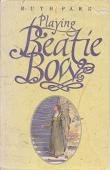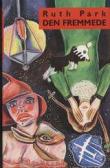AustLit
Latest Issues
AbstractHistoryArchive Description
Adaptations
-
form
y
 Playing Beatie Bow
( dir. Donald Crombie
)
Adelaide
:
South Australian Film Corporation
,
1986
Z950187
1986
single work
film/TV
young adult
fantasy
Playing Beatie Bow
( dir. Donald Crombie
)
Adelaide
:
South Australian Film Corporation
,
1986
Z950187
1986
single work
film/TV
young adult
fantasy
Set in Sydney over two distinct eras, Playing Beatie Bow begins in 1985, with teenager Abigail discovering that she can communicate beyond the grave with a person who lived in Sydney in 1873. As their communications continue, Abigail suddenly finds herself transported back in time, where she discovers a great deal more about herself than she would have done had she remained a discontented teen in modern times. Through her adventures, she also contributes to the lives of those around her.
-
form
y
 Playing Beatie Bow
United Kingdom (UK)
:
British Broadcasting Corporation (BBC)
,
1990
8188253
1990
series - publisher
radio play
fantasy
young adult
Playing Beatie Bow
United Kingdom (UK)
:
British Broadcasting Corporation (BBC)
,
1990
8188253
1990
series - publisher
radio play
fantasy
young adult
Radio adaptation of Playing Beatie Bow in three parts by British script-writer Joe Dunlop.
-
y
 Playing Beatie Bow
2021
Strawberry Hills
:
Currency Press
,
2021
20740909
2021
single work
drama
Playing Beatie Bow
2021
Strawberry Hills
:
Currency Press
,
2021
20740909
2021
single work
drama
'Abigail (Catherine Văn-Davies), a teenager dealing with her parents’ messy separation, follows the mysterious young girl Beatie Bow (Sofia Nolan) back through time – from the hustle and bustle of Sydney’s The Rocks in the present day to the year 1873, when the suburb was full of struggling immigrant families, gangsters and a whole host of larger-than-life characters. With the help of Beatie, her wise grandmother, and the whole Bow family, Abigail goes on a wild adventure through twisting alleyways of history in a race to find her way home.
'This moving human story is set in and around the real-life suburb that STC calls home and will overflow with history, song and sparkling humour. Grandparents, parents and teenagers will all find something to love in this family story – a combination of Mulvany’s characteristic warmth and vivacity and Williams’ monumental vision.' (Production summary)
Reading Australia
This work has Reading Australia teaching resources.
Unit Suitable For
AC: Year 7 (NSW Stage 4)
Themes
Colonial and contemporary Sydney, coming of age, family, hardship, identity, Language, poverty, resilience, the past, time travel
General Capabilities
Critical and creative thinking, Information and communication technology, Literacy, Personal and social
Teaching Resources
This work has teaching resources.
Lesson plan by Anthony Shaw for the 'Teaching Classic Australian Children's Fiction' Exhibition.
Affiliation Notes
-
This work is affiliated with the AustLit subset Asian-Australian Children's Literature and Publishing because it has a Japanese translation.
Publication Details of Only Known VersionEarliest 2 Known Versions of
Other Formats
- Braille.
- Sound recording.
- Large print.
Works about this Work
-
y
 Teaching Classic Australian Children's Fiction
Anthony Shaw
,
St Lucia
:
AustLit: The Australian Literature Resource
,
2016-
15827758
2016
website
prose
Teaching Classic Australian Children's Fiction
Anthony Shaw
,
St Lucia
:
AustLit: The Australian Literature Resource
,
2016-
15827758
2016
website
prose
This Exhibition is a collection of extensive teaching resources for classic Australian children's texts. The resources are aimed at upper primary school and lower high school teachers. The collection forms part of Anthony Shaw's Learning with Literature program.
-
[Essay] : Playing Beatie Bow
2013
single work
essay
— Appears in: Reading Australia 2013-;'Ruth Park’s Playing Beatie Bow (1980) is a fantastical, time-travel novel that is also fascinated with lived history. It is especially interested in the question of how, that is through what means and forms, our past is remembered and mediated. Do we remember the past through what is recorded in official archives and taught on school and university curricula? Or are there other ways of accessing what took place before our own time? It is a children’s nursery rhyme and a discarded piece of old cloth that enable the transportation of Playing Beatie Bow‘s Abigail Kirk back to Sydney’s The Rocks in 1873, suggesting that popular song and ephemeral objects can open historical horizons and be the catalyst for reconstructing meaningful stories.' (Introduction)
-
Slipping back through Time : Discovering Time-Slip Fiction
2012
single work
criticism
— Appears in: Magpies : Talking about Books for Children , May vol. 27 no. 2 2012; (p. 8-11) -
y
 Re-Visiting Historical Fiction for Young Readers : The Past through Modern Eyes
New York (City)
:
Routledge Taylor & Francis Group
,
2011
Z1886683
2011
single work
criticism
'This study is concerned with how readers are positioned to interpret the past in historical fiction for children and young adults. Looking at literature published within the last thirty to forty years, Wilson identifies and explores a prevalent trend for re-visioning and rewriting the past according to modern social and political ideological assumptions. Fiction within this genre, while concerned with the past at the level of content, is additionally concerned with present views of that historical past because of the future to which it is moving. Specific areas of discussion include the identification of a new sub-genre: Living history fiction, stories of Joan of Arc, historical fiction featuring agentic females, the very popular Scholastic Press historical journal series, fictions of war, and historical fiction featuring multicultural discourses.
Re-Visiting Historical Fiction for Young Readers : The Past through Modern Eyes
New York (City)
:
Routledge Taylor & Francis Group
,
2011
Z1886683
2011
single work
criticism
'This study is concerned with how readers are positioned to interpret the past in historical fiction for children and young adults. Looking at literature published within the last thirty to forty years, Wilson identifies and explores a prevalent trend for re-visioning and rewriting the past according to modern social and political ideological assumptions. Fiction within this genre, while concerned with the past at the level of content, is additionally concerned with present views of that historical past because of the future to which it is moving. Specific areas of discussion include the identification of a new sub-genre: Living history fiction, stories of Joan of Arc, historical fiction featuring agentic females, the very popular Scholastic Press historical journal series, fictions of war, and historical fiction featuring multicultural discourses.
Wilson observes specific traits in historical fiction written for children — most notably how the notion of positive progress into the future is nuanced differently in this literature in which the concept of progress from the past is inextricably linked to the protagonist's potential for agency and the realization of subjectivity. The genre consistently manifests a concern with identity construction that in turn informs and influences how a metanarrative of positive progress is played out. This book engages in a discussion of the functionality of the past within the genre and offers an interpretative frame for the sifting out of the present from the past in historical fiction for young readers.' (Publisher's blurb)
-
Living History Fiction
2010
single work
criticism
— Appears in: Papers : Explorations into Children's Literature , vol. 20 no. 1 2010; (p. 77-86) 'During my research into historical fiction for children and young adult readers I came across a range of texts that relied on a living or lived experience of history to frame the historical story. These novels were similar to the time-slip narrative; however, not all examples used the traditional convention of time-slippage. I wanted to bundle these novels together - 'time-slip' novels included - as examples of 'living history' narratives because they appeared from the outset as a distinct literary form requiring particular reading strategies.
These texts, which I will refer to as Living history novels, require readers to align uncritically with modern perception. Readers are persuasively invited to assume that the modern characters' perception of the past is authentic because it has been formed by a lived experience of history. In Living history novels, readers are positioned to perceive both the strengths and weaknesses of past and present times, ultimately reconciling the two in a present that faces chronologically forwards. Modern focalising characters in Living history fiction place modern perception in a superior relationship to that of the past.
This sub-genre of historical novels is distinctive in its strong and consistent modern character focalisation and point of view. The Living history novel creates a confluence of past and present, be it physically or psychically. Characters are variously conveyed from a generalised present, or past, to an explicit historical period or event. The Living history novel is distinctive in its intense character introversion, quest journey and self-discovery. The most important outcome of the living history experience is that characters learn something significant about themselves. Because the story is about the modern character's quest and self realisation, the past is consistently perceived from their point of view. Modern characters are transported in time and readers are only rarely invited to see the past from a past point of view' (Author's abstract).
-
Time and Emotion : The Australian Vision
1982
single work
review
— Appears in: Science Fiction : A Review of Speculative Literature , vol. 4 no. 1 (Issue 10) 1982; (p. 38-43)
— Review of The Man Who Loved Morlocks : A Sequel to The Time Machine as Narrated by the Time Traveller 1981 single work novel ; The Web of Time 1979 single work novel ; Playing Beatie Bow 1980 single work novel -
Fantasy Didacticism and a Disappearing Act : the Australian Children's Book Awards 1981
1981
single work
review
— Appears in: Australian Book Review , July no. 32 1981; (p. 5-7)
— Review of Playing Beatie Bow 1980 single work novel ; Darkness under the Hills 1980 single work novel ; Jandy Malone and the Nine O'Clock Tiger 1980 single work picture book ; Mr. Archimedes' Bath 1980 single work picture book ; Marty Moves to the Country 1980 single work picture book ; The Seventh Pebble 1981 single work children's fiction -
Children's Book Week
1981
single work
review
— Appears in: The Age , 11 July 1981;
— Review of Playing Beatie Bow 1980 single work novel -
Children's books of the year
1981
single work
review
— Appears in: The Sydney Morning Herald , July 1981; (p. 43)
— Review of Playing Beatie Bow 1980 single work novel -
Park Draws a Winning Bow
1991
single work
review
— Appears in: The Weekend Australian , 11-12 July 1991;
— Review of Playing Beatie Bow 1980 single work novel -
Over the Rim of Reality
1988
single work
criticism
— Appears in: Magpies : Talking About Books for Children , March vol. 3 no. 1 1988; (p. 4-8) -
Know the Author : Ruth Park
1988
single work
column
— Appears in: Magpies : Talking About Books for Children , March vol. 3 no. 1 1988; (p. 14-15) -
Stages of Development: Remembering Old Sydney in Ruth Park's Playing Beatie Bow and A Companion Guide to Sydney
2004
single work
criticism
— Appears in: Southerly , vol. 64 no. 3 2004; (p. 95-105) 'This essay highlights the role of the female as fetish in the captivity narrative...it contests the notion that authorial fascinations with the colonial past are necessarily concerned with totalising ownership claims and/or revisionist historical practices. Finally, Park's ... The Companion Guide to Sydney (1973), is linked to Playing Beatie Bow's deployment of the fetish as an object through which capture of the past is always partial and unreliable.' (pp 95-96) -
Medievalism as Heritage : Australian Children's Books
2006
single work
criticism
— Appears in: Medievalism and the Gothic in Australian Culture 2006; (p. 119-128) Valerie Krips discusses the 'trafficking' in history in three recent Australian children's books. She demonstrates how 'the past as represented in each novel is in the service of present concerns' (123). -
The Special Magic of the Eighties : Shaping Words and Shape-Shifting Words
1995
single work
criticism
— Appears in: Children's Literature in Education , December vol. 26 no. 4 1995; (p. 211-217) The author discusses the power of words to create 'a special magic' in texts published in the eighties.
Awards
- Sydney City, Inner Sydney, Sydney, New South Wales,
- 1870s
- 1970s











